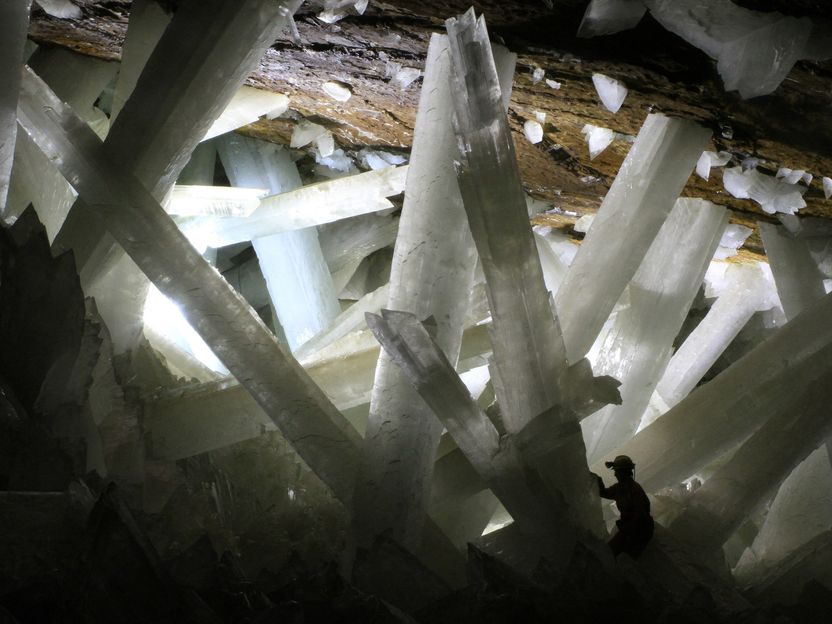New insights into crystallisation processes
The better the results of the crystallisation process of materials can be controlled and predicted, the greater the chances of producing Crystals that have specific characteristics and allow material properties to be optimised. Scientists at the Bundesanstalt für Materialforschung und -prüfung (BAM) in Berlin have presented new findings on crystal structure, which have been published in the journal PNAS of the National Academy of Sciences of the United States.

Anhydrite crystals in the Naica mine, Mexico
Alexander Van Driessche
Crystals are commonly regarded as the epitome of perfect order - a notion that has even led to them being attributed magical powers. Their orderly structure suggests that their growth also occurs in a very regular and orderly manner. In recent years, however, studies have challenged this "classical" view, and it is now considered likely that the growth of some crystalline materials can also occur in other ways.
To shed light on this question, a team of BAM researchers intensively analysed anhydrite crystals from Mexico and their growth history. They used crystals from the famous Naica mine in northern Mexico for their investigations. Natural caverns of the ore mine contain crystals that have grown over many millennia and are therefore particularly informative for crystallographers.
In their investigations, the scientists took a closer look at defects in the crystal samples in the nanometre to millimetre range and mapped the internal structure of the mineral in detail. These analyses showed that misalignment at the nanoscale spreads over length scales, eventually leading to the formation of voids inside the crystal that can even measure several tens of microns or more. They also found that these misalignment defects come from a so-called "seed of imperfection", leading to a macroscopic single crystal whose fragments do not fit together inside - even if the mineral appears perfect on the outside. The team thus came to the insight that misalignments on the nanoscale are amplified a million-fold during the growth process.
This new insight adds decisively to the concept of non-classical nucleation and crystalline growth processes. It is of great relevance for the development and production of new and improved materials.
Original publication
Other news from the department science

Get the chemical industry in your inbox
By submitting this form you agree that LUMITOS AG will send you the newsletter(s) selected above by email. Your data will not be passed on to third parties. Your data will be stored and processed in accordance with our data protection regulations. LUMITOS may contact you by email for the purpose of advertising or market and opinion surveys. You can revoke your consent at any time without giving reasons to LUMITOS AG, Ernst-Augustin-Str. 2, 12489 Berlin, Germany or by e-mail at revoke@lumitos.com with effect for the future. In addition, each email contains a link to unsubscribe from the corresponding newsletter.
Most read news
More news from our other portals
Last viewed contents
Fretting
Category:EC_1.11
PETN
Rhc80267
Stink_bomb
Stokes_Medal
Donut_Hole_(Medicare)
List_of_cocaine_analogues
Non-innocent_ligand
Nonanoic_acid
Combined_oral_contraceptive_pill





























































